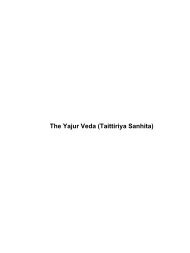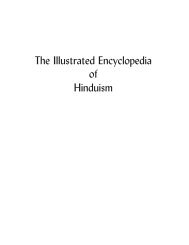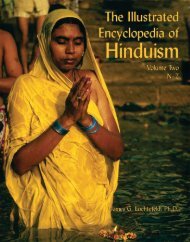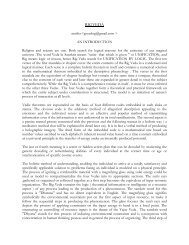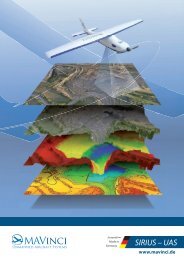A Concise Encyclopedia of Hinduism Klaus K Klostermaie
You also want an ePaper? Increase the reach of your titles
YUMPU automatically turns print PDFs into web optimized ePapers that Google loves.
27 asceticism<br />
Artha-ÿästra<br />
(‘the science <strong>of</strong> acquiring wealth<br />
[and power]’)<br />
A class <strong>of</strong> writings dealing with economics<br />
and politics. One such work, the<br />
Kauflilïya Ärtha-ÿästra, ascribed to the<br />
time <strong>of</strong> the MAURYAS, has been preserved<br />
and widely studied.<br />
Arunäcala (‘Red mountain’)<br />
A large hill in South India sacred to<br />
Ÿiva, next to Tiruvannamalai, an<br />
ancient place <strong>of</strong> pilgrimage. It became<br />
well known through RAMANA MAHARÆI<br />
who went there as a young boy and<br />
established an ashram that attracted<br />
many devotees from India and abroad.<br />
Äryans (from ärya, ‘noble’)<br />
The self-designation <strong>of</strong> the Vedic people<br />
as distinct from the anärya, the unfree<br />
and the tribals. Their rules were called<br />
ärya dharma; acting contrary to these<br />
was anärya, ‘ignoble’.<br />
Äryabhaflfla (fifth century CE)<br />
The earliest known Indian mathematician<br />
and astronomer, author <strong>of</strong> the<br />
famous Äryabhaflflïya and the Äryasiddhänta.<br />
He is also reputed to have introduced<br />
the decimal-place value system.<br />
Ärya Samäj<br />
(‘Äryan Society’)<br />
A reform movement founded in Bombay<br />
in 1875 by Swami DÄYÄNANDA<br />
SARASVATÏ (1824–83) from Morvi<br />
(Gujarat). Däyänanda considered popular<br />
puräæic <strong>Hinduism</strong> a corruption <strong>of</strong><br />
the Vedic tradition and wanted Hindus<br />
to return to the original Vedic DHARMA.<br />
He abolished all PÜJÄs and all devotional<br />
paraphernalia, reintroduced the<br />
Vedic fire sacrifice (AGNIHOTRA) and<br />
aimed at re-converting Indian Muslims<br />
and Christians to (reformed) <strong>Hinduism</strong>.<br />
The basic teachings <strong>of</strong> Däyänanda<br />
Sarasvatï are contained in his Satyärtha<br />
Prakäÿa (Splendour <strong>of</strong> the True<br />
Meaning (<strong>of</strong> the Veda), or ‘Light <strong>of</strong><br />
Truth’), the rituals are laid down in his<br />
Pañca-mahä-yajña-vidhi and the domestic<br />
rites are described in the Saskäravidhi.<br />
The VEDA alone is accepted as<br />
unconditionally true. He wished to<br />
make the Veda available to everyone,<br />
including women and people from low<br />
CASTES. Engagement on behalf <strong>of</strong> society<br />
at large and improvement <strong>of</strong> living conditions<br />
was also central to early Ärya<br />
Samäj practice.<br />
The Ärya Samäj established schools<br />
following the traditional GURUKULA system<br />
with SANSKRIT as medium <strong>of</strong><br />
instruction and traditional subjects as<br />
content. The Ärya Samäj split into two<br />
branches, one <strong>of</strong> which aimed at <strong>of</strong>fering<br />
modern English medium instruction.<br />
There are numerous DAV (Dayananda<br />
Anglo Vedic) colleges in India. Some<br />
members <strong>of</strong> the Ärya Samäj also became<br />
instrumental in the establishment <strong>of</strong><br />
Hindu nationalist organizations that are<br />
working for a transformation <strong>of</strong> India<br />
into a Hindu state, such as the RSS<br />
(RÄÆTØÏYA SVAYAMSEVAK SANGH), the<br />
JANA SANGH party (later merged into the<br />
JÄNATÄ PARTY and into the BJP<br />
(BHÄRATÏYA JÄNATÄ PARTY), the VIŸVA<br />
HINDÜ PARIÆAD and others.<br />
Today the Ärya Samäj has centres in<br />
all cities and towns <strong>of</strong> India and in<br />
many cities abroad and claims a membership<br />
<strong>of</strong> over a million.<br />
asat (‘non-being’)<br />
A condition <strong>of</strong> non-differentiation,<br />
assumed to exist before creation.<br />
asceticism<br />
Hindus were famous from antiquity for<br />
their asceticism. Ascetic practices<br />
(TAPAS) were assumed to create powers<br />
that are irresistible. Self-control and<br />
observation <strong>of</strong> a strict regimen were<br />
part <strong>of</strong> general ethics. A Hindu was




